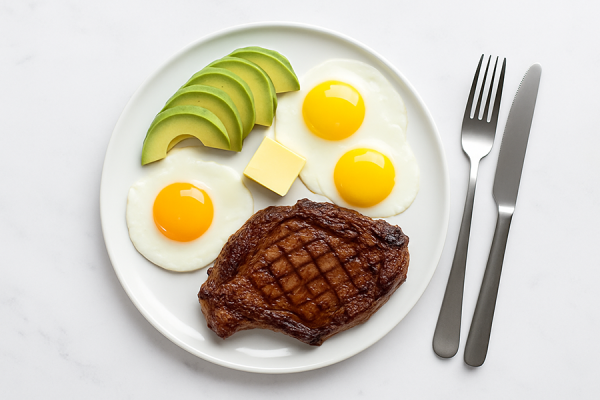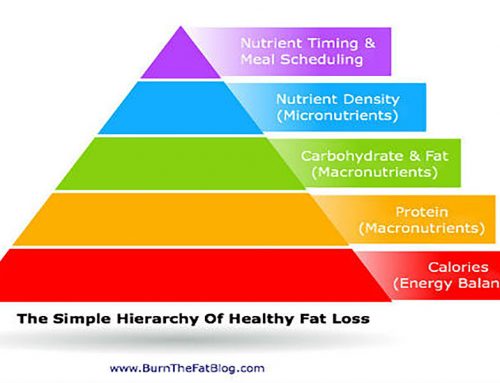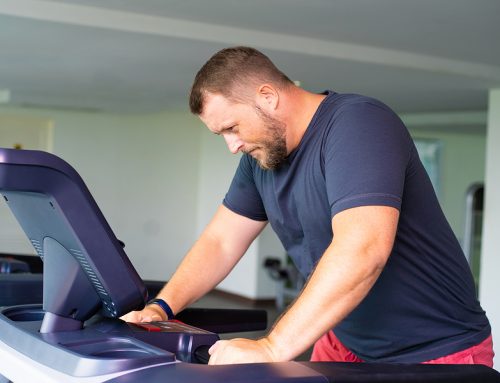Keto isn’t new. In fact, it’s one of the most talked-about diets of the past 30 years, and it goes back more than a century before that (back to William Banting circa 1864). So why are we still talking about it? Because even after all this time, many people still don’t understand how it actually works, or what the risks are when it’s done wrong.

I’ve tried variations of keto myself (years ago – it’s not how I eat today). I’ve studied the research too. And I’ve seen firsthand how it’s helped some people… but backfired for others.
That’s why I still get questions about this almost every week.
And that’s why I decided to write another post on this. I wanted to clear up confusion, bust myths, and explain, once and for all, who keto might actually work for, who it’s not for, and why it’s not “the best” diet or “fat loss miracle” it’s still sometimes made out to be.
What Is the Keto Diet, Really?
Keto isn’t just low-carb. It’s very low-carb (usually 20 to 50 grams per day) and very high-fat (often 70% of total calories). It’s also only moderate in protein, which surprises a lot of people who think keto is just lots of meat all day.
This extreme carb restriction pushes the body into ketosis, a metabolic state where your liver produces ketones to use as an alternative fuel source, primarily for the brain.
And yes, in ketosis, your body burns fat for fuel. But that doesn’t mean it magically burns body fat unless you’re in a calorie deficit. Burning the fat you’re eating for energy is not the same thing as burning body fat.
Real quick, let’s knock off a few keto myths that are STILL out there today.
Myth #1: “You Can Lose Fat in a Calorie Surplus If You’re in Ketosis”
This is one of the most damaging lies still circulating online. I’ve seen people claim they lost fat eating 3000 calories a day while their maintenance level was 2000, all because they were in ketosis.
Let’s be clear: a calorie surplus equals fat gain, regardless of your carb intake or hormonal state.
Keto may suppress appetite. It may help some people naturally eat less. But if you eat more calories than you burn – even on ZERO carbs – you will gain fat.
Myth #2: “Carbs Cause Fat Gain.”
Carbs don’t make you fat. Excess calories do.
Sure, if you eat a ton of sugar and refined junk, especially when combined with fat and salt, it’s easier to overeat. That’s why processed food is the real problem, not carbs themselves.
I’ve gotten cut for bodybuilding competitions eating 60% of my calories from carbs. I’ve also done it on lower carbs. The common denominator? A structured plan that creates a calorie deficit. Portion control.
Myth #3: Fat Loss Is About Hormones, Not Calories (Especially Insulin)
This idea just won’t die. Yes, insulin plays a role in fat metabolism. But the claim that insulin is the cause of fat gain, or that controlling insulin is more important than controlling calories has been debunked in study after study.
The science is clear: you can gain fat with low insulin if you’re in a calorie surplus. And you can lose fat with high insulin if you’re in a calorie deficit.
Insulin isn’t evil, it’s a normal hormone that helps you store and use nutrients. Demonizing it (and carbs along with it) is one of the biggest lies in diet culture, and keto doesn’t get a pass for spreading it.
Why Keto Seems to Work So Well (At First)
There’s no denying that many people lose weight quickly on keto. But a lot of that initial weight loss is water, not fat.
Why else might it work?
One reason is appetitite suppression. Protein with fat is filling. It can by psychologically satisfying too. That makes it easier to eat less, even if you’re not counting calories.
Another reason is simplicity. There’s something to be said for diets that don’t have a lot of rules or math. Cut carbs, eat meat/protein and fat. That’s the diet instructions basically. For some people, this level of simplicity improves adherence.
And let’s not forget this reason: Eliminating an entire food group – carbs – automatically cuts out a lot of processed junk. Fruit is not the enemy. Neither are veggies. But refined sugar is everywhere, and calorie dense.
So, keto can help control calories and even without tracking, at least for some. But what happens when you start craving carbs again? When I experimented with the steak and eggs diet years ago, it was actually pretty awesome at first. But it got old… fast. I needed some pancakes.
The Adherence Problem: Most People Quit
I remember Alan Aragon once telling a story about how he was giving a nutrition seminar and he asked the audience, “How many of you tried keto before?” 90% of the hands in the room went up. Then he asked, “By show of hands, how many of you are still following it?” Only 10% stayed up.
This is just an anecdote. But it’s what I’ve seen from my readers and what we see in the studies too. Adherence drops off. And when people fall off, they regain the weight.
Why? Because they missed their carbs. They felt deprived. And they didn’t fix the real issue: building a sustainable calorie-controlled lifestyle.
What About Health? Is Keto Dangerous?
That depends on how it’s done and who it’s for.
Done poorly: Lots of bacon, butter, processed keto snacks, barely any veggies means possible nutrient deficiencies and elevated LDL cholesterol.
(And side note: all those keto-branded foods by the way, might be the worst part about keto today. The food industry has co-opted keto for their own profit, and the irony is all these protein bars and keto breads and stuff are processed foods. Don’t get me started on “net carbs”).
Done intelligently: Whole foods, healthy fats, medical supervision, regular blood work = better results, possibly even improvements in health markers.
Still, many people don’t do keto this way. They just cut carbs, eat lots of fat, and hope for the best.
Even if health markers improve, the big question is: Was it the food, or just the weight loss? Because weight loss by itself, regardless of diet method, can improve many health indicators.
What About Muscle and Performance?
If you train hard, keto may not be your best friend.
Yes, you can gain muscle on keto, I don’t question that, but I don’t believe it’s optimal. Studies agree that your training performance is likely to suffer, especially on higher-volume or high-intensity training.
Without carbs, a lot of people report feeling sluggish in the gym. Carbs fuel long hard training sessions.
And remember, if keto suppresses appetite, which might help with weight loss, that makes it harder to get the calorie surplus you need for muscle growth.
So Who Should Consider Keto?
I’m not here to knock keto completely. Keto may help a small subset of the population:
- People with metabolic syndrome, type 2 diabetes, or severe carb intolerance
- Sedentary or less active individuals with high body fat
- Those who’ve tried other methods and just feel better on lower carbs with higher fat
- People who’ve researched it thoroughly and know that it’s just another way to control calories
- People who enjoy the eating style (the food can be very rich if you’re a good cook)
If that’s you, and it’s sustainable, fine. But if you’re highly active, metabolically healthy, and trying to build a lifestyle that lasts, there’s a better way.
My pick would be just good old fashioned bodybuilding-style nutrition with balanced macros and 90% unprocessd food. Sustainable. Always worked, always will.
Bottom Line
So, in this keto update, you can see I wasn’t here to attack keto. Just to say it’s also not magic:
It doesn’t give you a free pass to overeat
It’s not superior for fat loss
It’s harder to stick to long term for most people
It may come with real risks if done carelessly
And it’s definitely not required to get lean
That’s why I don’t recommend keto as the best place to start. I think of it as a novel diet approach.
It’s also why I wrote an entire chapter about it in my new ebook…
==> EXTREME FAT LOSS: The Uncensored Truth About 12 Controversial Fat Loss Methods
In this new guide, you’ll discover:
- The real science behind keto… and why most people misunderstand how it works
- 11 other controversial methods exposed, from carnivore to fasting to hacking your calories to 800 or less
- A risk/benefit rating system for each approach, based on facts, not fads
- And a no-BS framework to get leaner without extreme restrictions
==> Click here to find out more and get your copy now
Tom Venuto,
Author of Burn the Fat Feed the Muscle and the new Extreme Fat Loss Guide
Founder of Burn the Fat Inner Circle






Leave A Comment